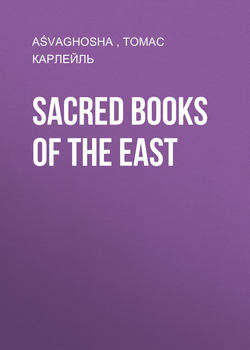Sacred Books of the East

Реклама. ООО «ЛитРес», ИНН: 7719571260.
Оглавление
Томас Карлейль. Sacred Books of the East
VEDIC HYMNS
INTRODUCTION
VEDIC HYMNS
TO THE UNKNOWN GOD
TO THE MARUTS1
TO THE MARUTS AND INDRA
TO INDRA AND THE MARUTS
TO AGNI AND THE MARUTS5
TO RUDRA6
TO RUDRA
TO AGNI AND THE MARUTS
TO VÂYU
TO VÂYU
INDRA AND AGASTYA: A DIALOGUE7
TO SOMA AND RUDRA
TO RUDRA
TO VÂTA
TO VÂTA
SELECTIONS FROM THE ZEND-AVESTA
INTRODUCTION
DISCOVERY OF THE ZEND-AVESTA
SELECTIONS FROM THE ZEND-AVESTA
THE CREATION10
MYTH OF YIMA
THE EARTH
CONTRACTS AND OUTRAGES11
UNCLEANNESS12
FUNERALS AND PURIFICATION
CLEANSING THE UNCLEAN
SPELLS RECITED DURING THE CLEANSING
TO FIRES, WATERS, PLANTS
TO THE EARTH AND THE SACRED WATERS
PRAYER FOR HELPERS
A PRAYER FOR SANCTITY AND ITS BENEFITS
TO THE FIRE
TO THE BOUNTIFUL IMMORTALS
PRAISE OF THE HOLY BULL
TO RAIN AS A HEALING POWER
TO THE WATERS AND LIGHT OF THE SUN
TO THE WATERS AND LIGHT OF THE MOON
TO THE WATERS AND LIGHT OF THE STARS
THE DHAMMAPADA
INTRODUCTION
THE DHAMMAPADA
CHAPTER I
CHAPTER II
CHAPTER III
CHAPTER IV
CHAPTER V
CHAPTER VI
CHAPTER VII
CHAPTER VIII
CHAPTER IX
CHAPTER X
CHAPTER XI
CHAPTER XII
CHAPTER XIII
CHAPTER XIV
CHAPTER XV
CHAPTER XVI
CHAPTER XVII
CHAPTER XVIII
CHAPTER XIX
CHAPTER XX
CHAPTER XXI
CHAPTER XXII
CHAPTER XXIII
CHAPTER XXIV
CHAPTER XXV
CHAPTER XXVI
THE UPANISHADS
INTRODUCTION
THE UPANISHADS
KAUSHÎTAKI-UPANISHAD
SELECTIONS FROM THE KORAN
INTRODUCTION
MOHAMMED AND MOHAMMEDANISM
THE KORAN
CHAPTER I
CHAPTER II
CHAPTER III
CHAPTER IV
CHAPTER V
LIFE OF BUDDHA
INTRODUCTION
LIFE OF BUDDHA
CHAPTER I
CHAPTER II
CHAPTER III
CHAPTER IV
CHAPTER V
Отрывок из книги
The Vedic Hymns are among the most interesting portions of Hindoo literature. In form and spirit they resemble both the poems of the Hebrew psalter and the lyrics of Pindar. They deal with the most elemental religious conceptions and are full of the imagery of nature. It would be absurd to deny to very many of them the possession of the truest poetic inspiration. The scenery of the Himalayas, ice and snow, storm and tempest, lend their majesty to the strains of the Vedic poet. He describes the storm sweeping over the white-crested mountains till the earth, like a hoary king, trembles with fear. The Maruts, or storm-gods, are terrible, glorious, musical, riding on strong-hoofed, never-wearying steeds. There is something Homeric, Pindaric in these epithets. Yet Soma and Rudra are addressed, though they wield sharp weapons; and sharp bolts, i.e., those of the lightning, are spoken of as kind friends. "Deliver us," says the poet, "from the snare of Varuna, and guard us, as kind-hearted gods." One of the most remarkable of these hymns is that addressed to the Unknown God. The poet says: "In the beginning there arose the Golden Child. As soon as he was born he alone was the lord of all that is. He established the earth and this heaven." The hymn consists of ten stanzas, in which the Deity is celebrated as the maker of the snowy mountains, the sea and the distant river, who made fast the awful heaven, He who alone is God above all gods, before whom heaven and earth stand trembling in their mind. Each stanza concludes with the refrain, "Who is the God to whom we shall offer sacrifice?"
We have in this hymn a most sublime conception of the Supreme Being, and while there are many Vedic hymns whose tone is pantheistic and seems to imply that the wild forces of nature are Gods who rule the world, this hymn to the Unknown God is as purely monotheistic as a psalm of David, and shows a spirit of religious awe as profound as any we find in the Hebrew Scriptures.
.....
"It is even so as thou hast said, O righteous Zarathustra! I, Ahura Mazda, seize the waters from the sea Vouru-kasha with the wind and the clouds. I, Ahura Mazda, take them to the corpses; I, Ahura Mazda, take them down to the Dakhmas; I, Ahura Mazda, take them down to the unclean remains; I, Ahura Mazda, take them down to the bones; then I, Ahura Mazda, make them flow back unseen; I, Ahura Mazda, make them flow back to the sea Pûitika. The waters stand there boiling, boiling up in the heart of the sea Pûitika, and, when cleansed there, they run back again from the sea Pûitika to the sea Vouru-kasha, towards the well-watered tree, whereon grow the seeds of my plants of every kind by hundreds, by thousands, by hundreds of thousands. Those plants, I, Ahura Mazda, rain down upon the earth, to bring food to the faithful, and fodder to the beneficent cow; to bring food to my people that they may live on it, and fodder to the beneficent cow.
"This is the best, this is the fairest of all things, even as thou hast said, O pure Zarathustra!"
.....